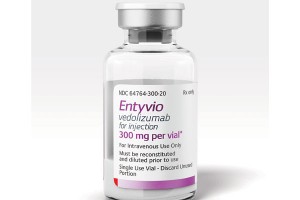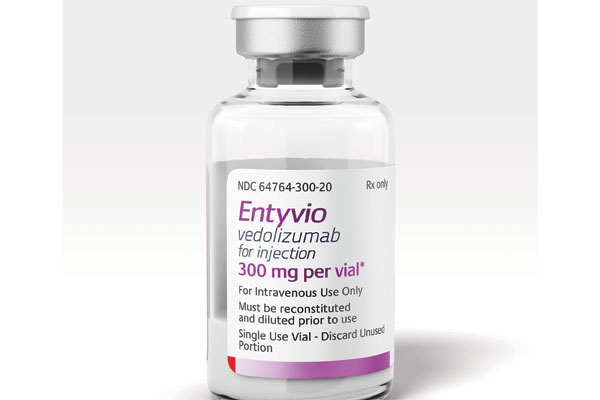 The Entyvio (vedolizumab) injection to treat adult patients with moderate to severe ulcerative colitis (UC) and Crohn‘s disease (CD) was recently approved by the U.S. Food and Drug Administration. The drug, which was developed by the largest pharmaceutical company in Japan, Takeda Pharmaceuticals, will now be commercially available to American healthcare providers and is recommended when one or more standard therapies don’t provide an adequate response.
The Entyvio (vedolizumab) injection to treat adult patients with moderate to severe ulcerative colitis (UC) and Crohn‘s disease (CD) was recently approved by the U.S. Food and Drug Administration. The drug, which was developed by the largest pharmaceutical company in Japan, Takeda Pharmaceuticals, will now be commercially available to American healthcare providers and is recommended when one or more standard therapies don’t provide an adequate response.
The injection is an integrin receptor antagonist indicated for the induction and maintenance of clinical response and remission, and has been proven to improve mucosal endoscopic appearance and achieve corticosteroid-free remission in UC patients. For CD patients, on the other hand, the results may include clinical response and remission as well as corticosteroid-free remission.
“We understand how a great need still exists for additional treatment options for ulcerative colitis and Crohn’s disease patients,” said Nicole Mowad-Nassar vice president of marketing for Takeda Pharmaceuticals. “We’re pleased that we were able to make Entyvio available for appropriate patients so quickly after receiving FDA approval.”
Takeda performed two clinical trials to assess the safety and effectiveness of Entyvio for UC, in which the company’s investigators enrolled about 900 patients who had not responded adequately to corticosteroids, immunomodulators, or tumor necrosis factor blocker medications. The evaluation of stool frequency, rectal bleeding, endoscopic findings, and a physician‘s overall assessment demonstrated that a greater percentage of participants treated with Entyvio achieved and maintained clinical response, achieved and maintained clinical remission, achieved corticosteroid-free clinical remission, and improved appearance of the colon compared to the patients treated placebo.
Regarding CD, the safety and effectiveness were established in three clinical trials that included about 1,500 participants who had not responded adequately to corticosteroids, immunomodulators, or tumor necrosis factor blocker medications. A greater percentage of the patients treated with Entyvio achieved clinical remission, as well as corticosteroid-free clinical remission, compared with placebo patients.
“Ulcerative colitis and Crohn‘s disease are debilitating diseases that impact the quality of life of those who have these conditions,” said Amy G. Egan, M.D., M.P.H, the acting deputy director of the Office of Drug Evaluation III in the FDA‘s Center for Drug Evaluation and Research. “Although there is no cure for these conditions, today‘s approval provides an important new treatment option for patients who have had an inadequate response to conventional therapy to help control their symptoms.”
Ulcerative colitis affects about 6,200 Americans and not only is an incurable and chronic disease, but it is also one of two main forms of chronic inflammatory bowel disease. The disease causes ulcers in the inner lining of the large intestine as well as inflammation, which can lead to abdominal discomfort, gastrointestinal bleeding, and diarrhea. CD is also a chronic disease that causes inflammation, swelling, and irritation of any part of the digestive tract. More than a half million Americans have been diagnosed with the disease. While UC affects only the large intestine, CD can impact any part of the digestive tract.
Last month, Entyvio was also approved by FDA and by the European Commission for the treatment of UC and CD in adult patients with moderate to severely active disease, and for whom response to a tumor necrosis factor blocker, immunomodulator or corticosteroids was inadequate. The EC approval was a major gain for both doctors and patients, since the drug is seen as a promising new therapeutic option.
Takeda also announced the launch of a service for patients in need of access and services for Entyvio. EntyvioConnect includes a series of case managers available to help patients determine their coverage for Entyvio, understand their options to assist with treatment affordability, and answer questions about access to the medication once it has been prescribed by a doctor.

